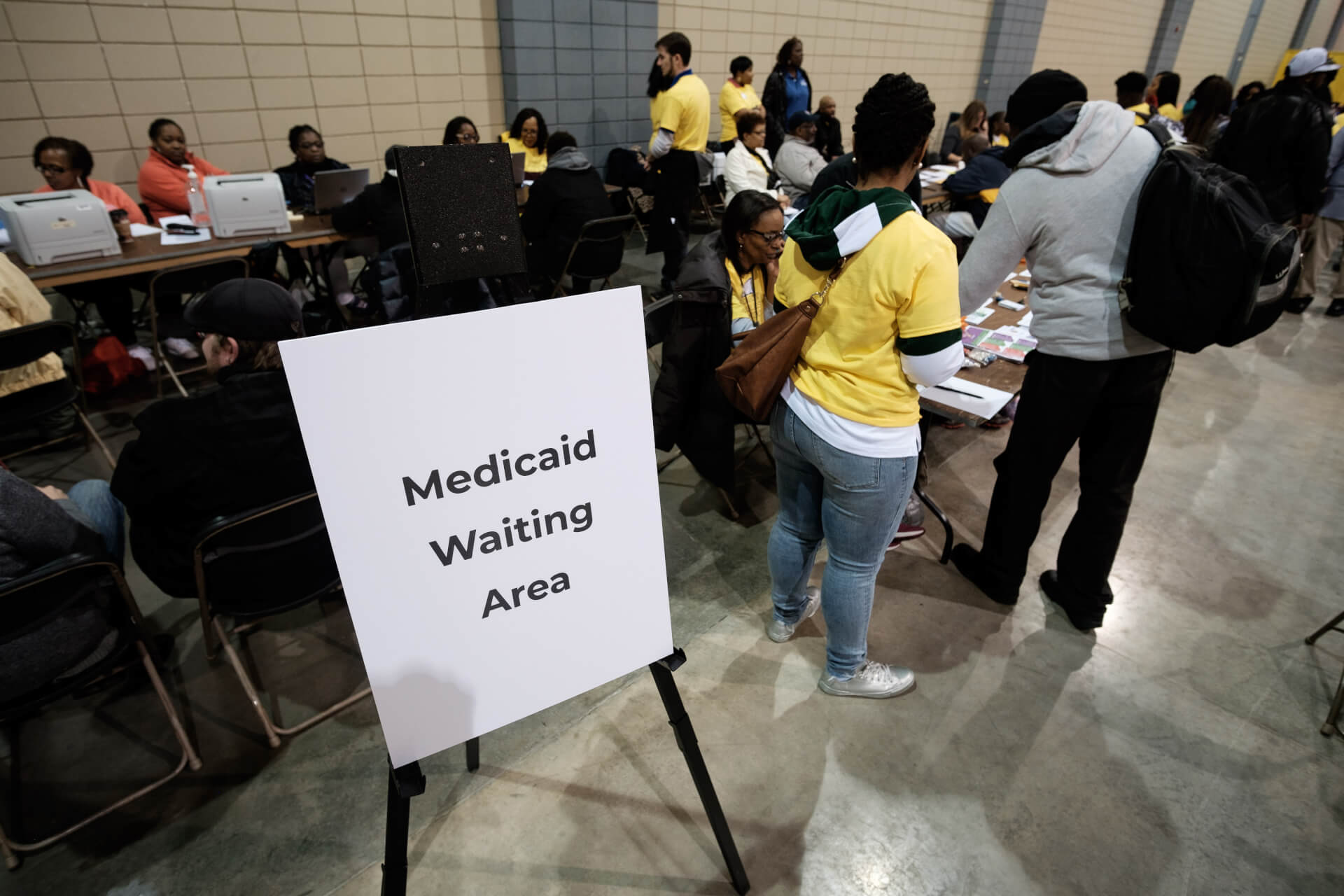5:28
News Story
9 states, including Virginia, poised to end coverage for millions if Trump cuts Medicaid funding
With Donald Trump’s return to the White House and Republicans taking full control of Congress in 2025, the Affordable Care Act’s Medicaid expansion is back on the chopping block.
More than 3 million adults in nine states would be at immediate risk of losing their health coverage should the GOP reduce the extra federal Medicaid funding that’s enabled states to widen eligibility, according to KFF, a health information nonprofit that includes KFF Health News, and the Georgetown University Center for Children and Families. That’s because the states have trigger laws that would swiftly end their Medicaid expansions if federal funding falls.
The states are Arizona, Arkansas, Illinois, Indiana, Montana, New Hampshire, North Carolina, Utah, and Virginia.
The 2010 Affordable Care Act encouraged states to expand Medicaid programs to cover more low-income Americans who didn’t get health insurance through their jobs. Forty states and the District of Columbia agreed, extending health insurance since 2014 to an estimated 21 million people and helping drive the U.S. uninsured rate to record lows.
In exchange, the federal government pays 90% of the cost to cover the expanded population. That’s far higher than the federal match for other Medicaid beneficiaries, which averages about 57% nationwide.
Conservative policy groups, which generally have opposed the ACA, say the program costs too much and covers too many people. Democrats say the Medicaid expansion has saved lives and helped communities by widening coverage to people who could not afford private insurance.
If Congress cuts federal funding, Medicaid expansion would be at risk in all states that have opted into it — even those without trigger laws — because state legislatures would be forced to make up the difference, said Renuka Tipirneni, an associate professor at the University of Michigan’s School of Public Health.
Decisions to keep or roll back the expansion “would depend on the politics at the state level,” Tipirneni said.
For instance, Michigan approved a trigger as part of its Medicaid expansion in 2013, when it was controlled by a Republican governor and legislature. Last year, with the government controlled by Democrats, the state eliminated its funding trigger.
Six of the nine states with trigger laws — Arizona, Arkansas, Indiana, Montana, North Carolina, and Utah — went for Trump in the 2024 election.
Most of the nine states’ triggers kick in if federal funding falls below the 90% threshold. Arizona’s trigger would eliminate its expansion if funding falls below 80%.
Montana’s law rolls back expansion below 90% funding but allows it to continue if lawmakers identify additional funding. Under state law, Montana lawmakers must reauthorize its Medicaid expansion in 2025 or the expansion will end.
Across the states with triggers, between 3.1 million and 3.7 million people would swiftly lose their coverage, researchers at KFF and the Georgetown center estimate. The difference depends on how states treat people who were added to Medicaid before the ACA expansion; they may continue to qualify even if the expansion ends.
Three other states — Iowa, Idaho, and New Mexico— have laws that require their governments to mitigate the financial impact of losing federal Medicaid expansion funding but would not automatically end expansions. With those three states included, about 4.3 million Medicaid expansion enrollees would be at risk of losing coverage, according to KFF.
The ACA allowed Medicaid expansions to adults with incomes up to 138% of the federal poverty level, or about $20,783 for an individual in 2024.
Nearly a quarter of the 81 million people enrolled in Medicaid nationally are in the program due to expansions.
“With a reduction in the expansion match rate, it is likely that all states would need to evaluate whether to continue expansion coverage because it would require a significant increase in state spending,” said Robin Rudowitz, vice president and director of the Program on Medicaid and the Uninsured at KFF. “If states drop coverage, it is likely that there would be an increase in the number of uninsured, and that would limit access to care across red and blue states that have adopted expansion.”
States rarely cut eligibility for social programs such as Medicaid once it’s been granted.
The triggers make it politically easier for state lawmakers to end Medicaid expansion because they would not have to take any new action to cut coverage, said Edwin Park, a research professor at the Georgetown University Center for Children and Families.
To see the impact of trigger laws, consider what happened after the Supreme Court in 2022 struck down Roe v. Wade and, with it, the constitutional right to an abortion. Conservative lawmakers in 13 states had crafted trigger laws that would automatically implement bans in the event a national right to abortion were struck down. Those state laws resulted in restrictions taking effect immediately after the court ruling, or shortly thereafter.
States adopted triggers as part of Medicaid expansion to win over lawmakers skeptical of putting state dollars on the hook for a federal program unpopular with most Republicans.
It’s unclear what Trump and congressional Republicans will do with Medicaid after he takes office in January, but one indicator could be a recent recommendation from the Paragon Health Institute, a leading conservative policy organization led by former Trump health adviser Brian Blase.
Paragon has proposed that starting in 2026 the federal government would phase down the 90% federal match for expansion until 2034, when it would reach parity with each state’s federal match for its traditional enrollees. Under that plan, states could still get ACA Medicaid expansion funding but restrict coverage to enrollees with incomes up to the federal poverty level. Currently, to receive expansion funding, states must offer coverage to everyone up to 138% of the poverty level.
Daniel Derksen, director of the Center for Rural Health at the University of Arizona, said it’s unlikely Arizona would move to eliminate its trigger and make up for lost federal funds. “It would be a tough sell right now as it would put a big strain on the budget,” he said.
Medicaid has been in the crosshairs of Republicans in Washington before. Republican congressional leaders in 2017 proposed legislation to cut federal expansion funding, a move that would have shifted billions in costs to states. That plan, part of a strategy to repeal Obamacare, ultimately failed.
Our stories may be republished online or in print under Creative Commons license CC BY-NC-ND 4.0. We ask that you edit only for style or to shorten, provide proper attribution and link to our website. AP and Getty images may not be republished. Please see our republishing guidelines for use of any other photos and graphics.





